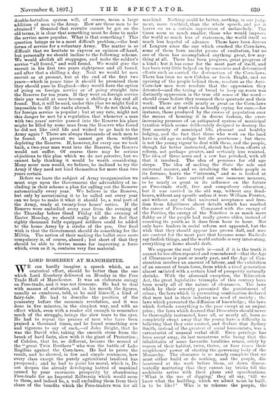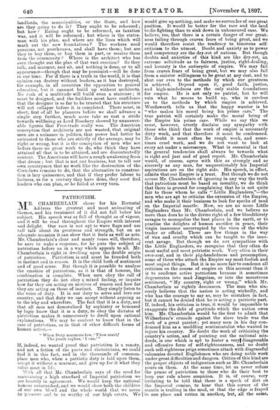LORD ROSEBERY AT MANCHESTER.
WE can hardly imagine a speech which, as an oratorical effort, should be better than the one which Lord Rosebery delivered on Monday in the Free Trade Hall of Manchester. It was an elaborate eulogy on Free-trade, and it was not tiresome. He had to deal with masses of statistics, and in his mouth the figures, usually so cumbrous, told, as he said himself, a kind of fairy-tale. He had to describe the position of the peasantry before the economic revolution, and it was done in five minutes, in the simplest way, and with an effect which, even with a reader old enough to remember much of the struggle, brings the slow tears to the eyes. He had to repeat the praises of men who have been praised a thousand times, and he found something new and vigorous to say of each,—of John Bright, that he was the David who, taking the smooth stone from the brook of hard facts, slew with it the giant of Protection ; of Cobden, that he, so different, became the second of the "great Twin Brothers" who won the battle of Lake Regillus against the Corn-laws. He had to prove the result, and he showed, in few and simple sentences, how every class except the purely agricultural landlord has prospered ; and he had to point his moral, which is, Do not deepen the already developing hatred of mankind caused by your enormous prosperity by abandoning Free-trade for an Imperial Zollverein which would seem to them, and indeed be, a wall excluding them from their share of the benefits which the Free-traders won for all mankind. Nothing could be better, nothing, in our judg- ment, more truthful, than the whole speech, and yet it leaves on us a certain impression of melancholy. The times seem so much smaller, those who would improve the world so much less of statesmen, the world itself so much less hopeful of advance. There have been dozens of Leagues since the one which crushed the Corn-laws, some of them born amidst pwans of exultation, but no one of them has accomplished anything great, few any- thing at all. There has been progress, great progress of a kind ; but it has come for the most part of itself, and has been very little helped on by conscious and determined efforts such as carried the destruction of the Corn-laws. There has been no new Cobden or fresh Bright, and no uprising of the people behind them, resolute as the Anti- Corn-law men were resolute that the oppression they detested—and the taxing of bread to keep up rents was distinctly oppression in the true old sense of the word— should cease before they resumed their quietude and their work. There are evils nearly as great as the Corn-laws around us, or at least evils as loudly crying for cure,—for instance, those produced by the excess of population over the means of housing it in decent fashion, the ever- increasing pressure of an antiquated system of municipal taxation which seems deliberately designed to destroy the first amenity of municipal life, pleasant and healthy lodging, and the fact that those who work on the land have in old age no refuge but the poorhouse ; but there is not the young vigour to deal with them, and the people, though far better instructed, shrink back from efforts at reform, not perhaps greater, and certainly less resisted. The idea of three acres and a cow has perished, with all that it involved. The idea of pensions for old age sleeps. The idea of making the State the sole and universal insurer, and so involving the whole people in its fortune, hurts the "interests," and so is looked at askance. We have carried out one immense measure, to be nearly as great in its influence on the future as Free-trade itself, free and compulsory education ; but it was carried in the old way, without any dead- heave, without any apostle unless it were William Forster, and without any of that universal acceptance and free- dom from fidgetiness about details which has marked the career of Free-trade. Compared with the energy of the Forties, the energy of the Nineties is as much more flabby as if the people had really grown older, instead of renewing its youth as it does from hour to hour. Not only have leaders in social reform not appeared, but the wish that they should appear has grown dull, and men are content for the most part that because some Radicals say foolish things, and the world outside is very interesting, everything at. home should drift.
We suppose the real truth is—and if it is the truth it cannot be too often repeated and remembered—that the Age of Clearances is past or nearly past, and the Age of Con- struction involves an amount of labour, and the exhibition of an amount of brain force, from which a tired generation almost satiated with a certain kind of prosperity naturally shrinks. With the aforesaid exception, the Education Act, the great legislative triumphs of this century have been nearly all of the nature of clearances. The laws which by their severity prevented the punishment of crime; the laws which in preventing combination declared that men had in their industry no need of society ; the laws which prevented the diffusion of knowledge ; the laws which forbade everything to the poor except at an unjust price ; the laws which decreed that Dissenters should never be thoroughly instructed, have all, or nearly all, been so completely swept away that the young have a difficulty in believing that they ever existed, and declare that Sydney Smith, instead of the greatest of social humourists, was a caricaturist of unusual verbal skill. Even privilege has been swept away, its last monstrous relic being that the inhabitants of some favourite localities retain, solely by reason of their habitat, twice, thrice, or four times their neighbours' power of electing the governing body of the Monarchy. The clearance is so nearly complete that we must either build or do nothing, and the people, dis- heartened at the work before them, sit down discon- tentedly muttering that they cannot lay bricks till the architects arrive with their plans and specifications. 'What is the use of digging,' they all say, till we know what the building, which we admit must be built, is to be like ?' Who is to rehouse the people, the landlords, the municipalities, or the State, and how are they going to do it? They ought to be rehoused ; but how ? Rating ought to be reformed, as taxation was, and it will be reformed ; but where is the states- man with his plan, and where are the lines which will mark out the new foundations ? The workers need pensions, not poorhouses, and shall have them ; but are they to buy them, or buy them in part, or receive them from the community ? Where is the architect who has even thought out the plan of that vast erection? So they talk, and murmur, and sit, and nothing is done, or to all appearance—though that may be pessimist—will be done in our time. For if there is a truth in the world, it is that opinion can destroy without leaders, as it has destroyed, for example, in all countries the opposition to general education, but it cannnot build up without architects. No rush of a multitude will build even a staircase ; it must be designed, and the builders must have confidence that the designer is so far to be trusted that his structure will not collapse before it is completed. There must, in short, first of all be planners before we shall advance a single step further, much more take so vast a stride towards wellbeing as Lord Rosebery showed by unanswer- able figures that Free-trade really was. The American 'conception that architects are not wanted, that original mien are a nuisance in politics, that power had better be entrusted to those who are strictly of the average, may be right or wrong, but it is the conception of men who see before them no great work to do, who think they have attained all that is to be attained, and are discontentedly content. The Americans will have a rough awakening from that dream ; but that is not our business, but to tell our own countrymen that no work like the destruction of the Corn-laws remains to do, that the alternative to construc- tion is lazy quiescence, and that if they prefer labour to laziness, as for a century they have done, they must find leaders who can plan, or be foiled at every turn.























































 Previous page
Previous page